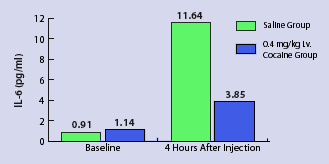Cocaine May Compromise Immune System, Increase Risk of Infection
Download PDF Version What is PDF?
Patrick Zickler
Patrick Zickler is a Staff Writer for NIDA NOTES.
Source: NIDA NOTES, Vol. 18, No. 6, February, 2004
Public Domain
Table of Contents (TOC)
Article: Cocaine May Compromise Immune System, Increase Risk of InfectionReferences
Cocaine abusers are more likely than nonusers to suffer from HIV, hepatitis, sexually transmitted diseases, and other infections. Most of this increased incidence is the result of conditions and behaviors--for example, injecting drugs, poor nutrition, and unsafe sex--that often are associated with drug abuse. Now, NIDA-supported investigators at the McLean Hospital Alcohol and Drug Abuse Research Center in Belmont, Massachusetts, have found that cocaine itself has a direct biological effect that may decrease an abuser’s ability to fight off infections.
Dr. John H. Halpern, along with colleagues at McLean Hospital and Harvard Medical School, found that a key immune system component, a protein called interleukin-6 (IL-6), responded less robustly to an immunological challenge in male and female abusers injected with cocaine than in those who received placebo. "When your body detects a foreign object, IL-6 helps trigger the release of a cascade of other immune system components that isolate and neutralize the threat," explains Dr. Halpern. "If the balance of this response is disrupted, your body cannot fight infection as effectively as it should."
Cocaine Use May Increase Infection Risk
 Elevations in the protein interleukin-6 (IL-6) play a key role in resisting infections when viruses, bacteria, or foreign objects, such as a catheter, enter the body. IL-6 elevations following insertion of a catheter were smaller in volunteers given cocaine than in volunteers given saline, suggesting that the drug may impair cocaine users’ ability to fight off infectious diseases.
Elevations in the protein interleukin-6 (IL-6) play a key role in resisting infections when viruses, bacteria, or foreign objects, such as a catheter, enter the body. IL-6 elevations following insertion of a catheter were smaller in volunteers given cocaine than in volunteers given saline, suggesting that the drug may impair cocaine users’ ability to fight off infectious diseases.
The study involved 30 participants (16 women, 14 men, ages 21-35) with a history of cocaine abuse, including at least one drug administration within the past month. The investigators placed an intravenous catheter in one arm of each participant and measured IL-6 levels. The catheter is detected as foreign by the body’s immune system and triggers an immune response. After 30 minutes, the researchers injected cocaine or saline solution (0.4 mg/kg) into each participant’s other arm; 4 hours later, they measured IL-6 levels again. In participants given saline, IL-6 levels had more than quintupled in response to the presence of the catheter, increasing from an average of less than 2 trillionths of a gram (picograms, or pg) per milliliter of blood to an average of more than 11 pg/ml. In men and women who received cocaine, however, IL-6 levels barely doubled--from less than 2 pg/ml to an average of 3.8 pg/ml.
"The findings in this study show that in people with a history of cocaine abuse, exposure to the drug establishes conditions that can lead to immediate harm," Dr. Halpern says. "In such subjects, we found that cocaine impairs the body’s defense system for at least 4 hours. We can’t rule out the possibility that IL-6 response returns to normal shortly after that time. But even if the blunted immune response lasts only a few hours, it makes it more likely that an infection like HIV or just a common cold can take hold," Dr. Halpern says.
 "This research suggests a link between cocaine use and
compromised immune response and could help explain the high
incidence of infectious disease among drug abusers," observes
Dr. Steven Grant of NIDA’s Division of Treatment Research
and Development. "It reminds us that the health consequences
of drug abuse reach far beyond disruption of the brain systems
involved in abuse and addiction."
"This research suggests a link between cocaine use and
compromised immune response and could help explain the high
incidence of infectious disease among drug abusers," observes
Dr. Steven Grant of NIDA’s Division of Treatment Research
and Development. "It reminds us that the health consequences
of drug abuse reach far beyond disruption of the brain systems
involved in abuse and addiction."
The findings also have significance in another context, Dr. Grant adds. "The IL-6 findings are a small but possibly significant part of a much larger study designed to gather a wide range of information on the acute and chronic effects of abused drugs on the brain, endocrine system, and immune function. This kind of discovery-based research can yield unexpected, sometimes important, insights."
Halpern, J.H., et al. Diminished interleukin-6 response to proinflammatory challenge in men and women after intravenous cocaine administration. Journal of Clinical Endocrinology and Metabolism 88(3):1188-1193, 2003.


